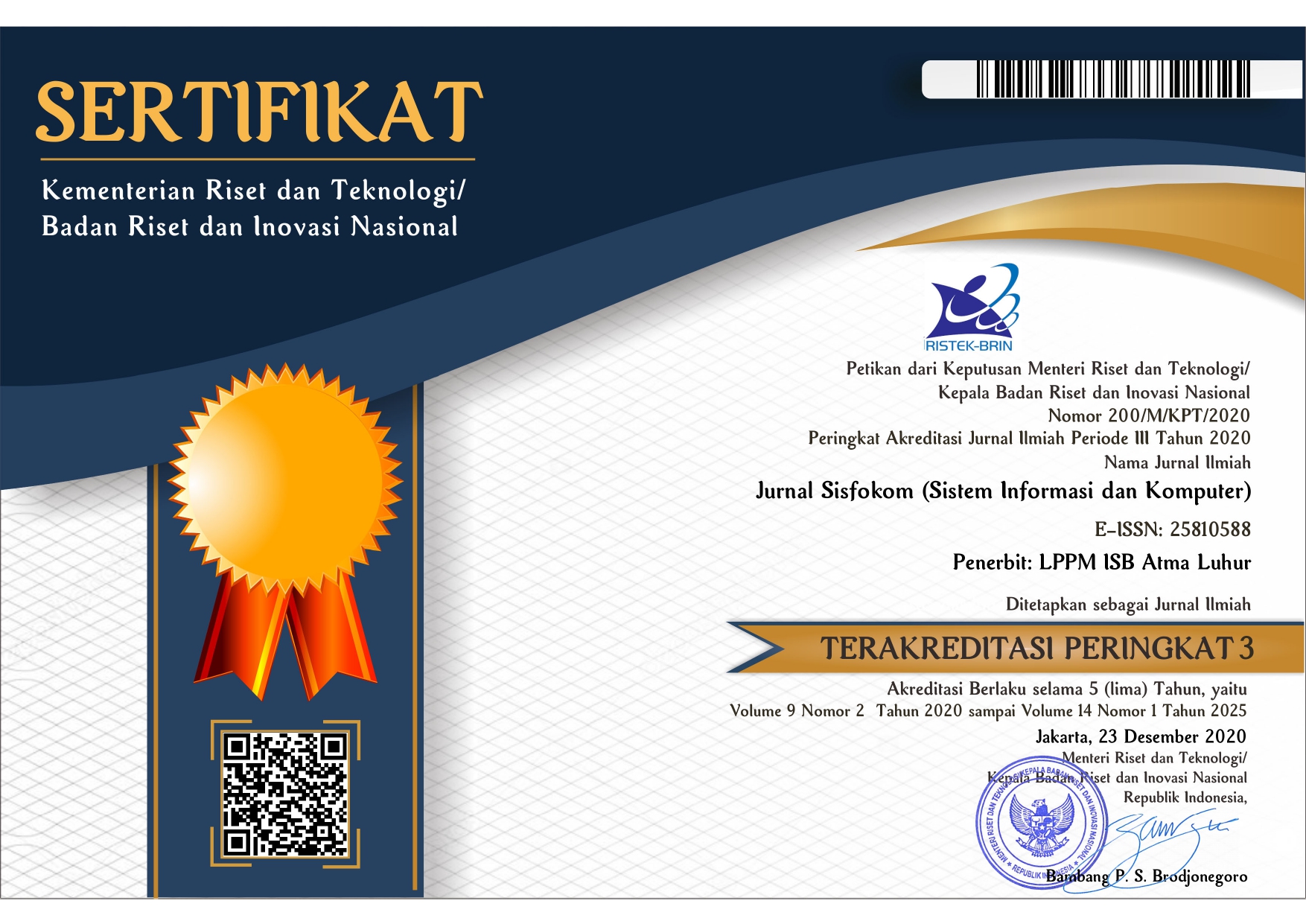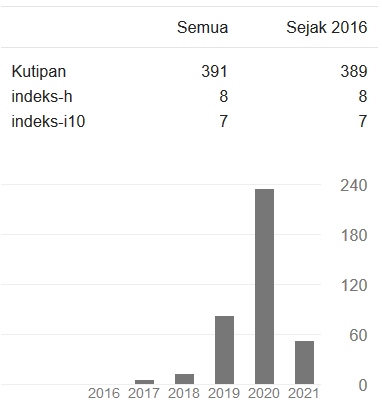Online Travel Agent Marketing Strategy Through Social Interaction During the Pandemic COVID-19
DOI:
https://doi.org/10.32736/sisfokom.v12i2.1553Keywords:
Online Travel Agent, Twitter, Promotion, Application FeatureAbstract
The Covid-19 pandemic has had such a devastating impact on Online Travel Agents such as Traveloka that it has made it to the lowest phase it has ever experienced. There are government regulations that limit people's social interactions so that various strategies are carried out, from using promos or utilizing application features. The purpose of this research is to find out whether the difference in social interaction between Traveloka users before and during the Covid pandemic was significant enough to evaluate Traveloka's marketing strategy. Decreased application usage, ticket rescheduling requests to refund requests which are currently Traveloka's problems. This research is qualitative research that uses the Social Network Analysis (SNA) method using the Twitter application assisted by the Jupyter Anaconda application, Google collab, and Ghepi. From the visualization of this study, the results obtained from 3 research focuses had significant differences from social interactions using Traveloka during the pandemic. From promos that experienced a decrease in interaction during the pandemic, Traveloka Xperience experienced an increase in feature usage, and the ticket feature experienced a decline in social interaction. So that Traveloka is expected to improve the company's strategy to survive during the pandemic.References
D. C. U. Lieharyani and R. Ambarwati, “Visualisasi Data Tweet di Sektor Pendidikan Tinggi Pada Saat Masa Pandemi,” Build. Informatics …, vol. 4, no. 1, pp. 116–123, 2022, doi: 10.47065/bits.v4i1.1551.
Z. Harirah and A. Rizaldi, “Merespon Nalar Kebijakan negara Dalam Menangani Pandemi Covid-19 Di Indonesia,” J. Ekon. dan Kebijak. Publik Indones., vol. 7, no. 1, pp. 36–53, 2020.
J. Eliasson, “Will we travel less after the pandemic?,” Transp. Res. Interdiscip. Perspect., vol. 13, p. 100509, 2022, doi: 10.1016/j.trip.2021.100509.
S. . Zahratu and R. Hurriyati, “Electronic Word of Mouth and Purchase Intention on Traveloka,” vol. 117, no. Gcbme 2018, pp. 33–36, 2020, doi: 10.2991/aebmr.k.200131.008.
L. S. Saragih, “Dampak Online Travel Agent (OTA) Dalam Meningkatkan Minat Pengunjung Di Pardede Internasional Hotel Medan,” J. Online Nas., vol. 3, no. 1, p. 48, 2019.
C. L. M. Raharja and A. D. Hadisumarto, “The Role of Perceived Risks on Millennials on Online Purchase Intention at Travel Agencies During the Covid-19 Pandemic,” Proc. Int. Conf. Bus. Eng. Manag. (ICONBEM 2021), vol. 177, pp. 118–123, 2021, doi: 10.2991/aebmr.k.210522.016.
A. F. I. Himawan and M. E. Faisal, “Positioning Travel Sites Online Traveloka According to Student Perception in Gresik using Method Multidimensional Scaling,” vol. 144, no. Afbe 2019, pp. 178–184, 2020, doi: 10.2991/aebmr.k.200606.029.
Asnawati, M. Nadir, W. Wardhani, and M. Setini, “The effects of perceived ease of use, electronic word of mouth and content marketing on purchase decision,” Int. J. Data Netw. Sci., vol. 6, no. 1, pp. 81–90, 2022, doi: 10.5267/J.IJDNS.2021.10.001.
M. Saputra, R. Rahab, and N. Najmudin, “The Effect of Price and Product Quality on Consumer Purchase Decisions Case Study on Fremilt Product by Relita,” vol. 000, pp. 779–784, 2021.
A. Putri, F. Kinanda, O. Marpaung, and B. Siburian, “E-Service Quality, Promotion and Price Perception on Loyalty of Traveloka Users,” Int. J. Informatics, Econ. Manag. Sci., vol. 1, no. 2, pp. 113–124, 2022, doi: 10.52362/ijiems.v1i2.879.
Iin Rachmawati, “the Phenomenon of €˜Traveloka Xperienceâ€TM From the Perspectives of Entertainment Media Enthusiasts in Surabaya,” JELAJAH J. Tour. Hosp., vol. 3, no. 2, pp. 40–49, 2022, doi: 10.33830/jelajah.v3i2.2270.
A. Syahrini and E. Arif, “The Influence of Price , Trust and Sales Promotion on Purchase Intention of Traveloka Mobile Application,” J. Ilm. Manaj. FEB UB, vol. 8, no. 2, pp. 1–8, 2019.
J. Samuel et al., “Feeling Positive about Reopening? New Normal Scenarios from COVID-19 US Reopen Sentiment Analytics,” IEEE Access, vol. 8, pp. 142173–142190, 2020, doi: 10.1109/ACCESS.2020.3013933.
A. Mathur, P. Kubde, and S. Vaidya, “Emotional analysis using twitter data during pandemic situation: Covid-19,” Proc. 5th Int. Conf. Commun. Electron. Syst. ICCES 2020, no. Icces, pp. 845–848, 2020, doi: 10.1109/ICCES48766.2020.09138079.
M. Óskarsdóttir, C. Bravo, C. Sarraute, J. Vanthienen, and B. Baesens, “The value of big data for credit scoring: Enhancing financial inclusion using mobile phone data and social network analytics,” Appl. Soft Comput. J., vol. 74, pp. 26–39, 2019, doi: 10.1016/j.asoc.2018.10.004.
F. Magdalena, M. Tri Lestari, and S. Nurfebiaraning, “Pengaruh Promosi Traveloka @Traveloka Melalui Twitter Terhadap Keputusan Pembelian (Survei Terhadap Followers Akun Twitter @Traveloka),” J. Sosioteknologi, vol. 15, no. 3, pp. 371–377, 2016, doi: 10.5614/sostek.2016.15.3.5.
M. M. . Zainnary Dwiwani, Krishna Kusumahadi, B.Sc., “ANALISIS TOPIK PERBINCANGAN DAN KEY PLAYER PADA MEDIA SOSIAL TWITTER MENGGUNAKAN METODE SENTIMENT ANALYSIS DAN SOSIAL NETWORK ANALYSIS (Studi Kasus Pada Traveloka, Tiket.Com dan PegiPegi),” -Proceeding Manag. , vol. 2, no. 1, pp. 1–12, 2020.
E. Mitei and T. Ghanem, “Leveraging Social Network Analysis to Explore Obesity Talks on Twitter,” Proc. - 2020 IEEE Int. Conf. Big Data, Big Data 2020, pp. 3563–3572, 2020, doi: 10.1109/BigData50022.2020.9377798.
S. H. Utami, A. A. Purnama, and A. N. Hidayanto, “Fintech Lending in Indonesia: A Sentiment Analysis, Topic Modelling, and Social Network Analysis using Twitter Data,” Int. J. Appl. Eng. Technol., vol. 4, no. 1, pp. 50–56, 2022.
N. Puspitasari, D. E. S. J, P. S. Akuntansi, F. Ekonomi, and U. M. Yogyakarta, “Generation Z and Information Visualization : Work from Home Managerial Task Context,” prosiding.umy.ac.id, 2022.
T. Sihombing and D. Sihombing, “Influence of Interest, Price, Product Quality, Promotion, and Brand Image on Purchasing Decisions in Traveloka App,” Ultim. Manag. J. Ilmu Manaj., vol. 13, no. 1, pp. 183–196, 2021, doi: 10.31937/manajemen.v13i1.1968.
T. M. S. Kathrin Regina, Lira Agusinta, “the Effect of Sales Promotion on Purchase Intention Through Customer Perceived Value on E- Commerce During the Covid-19 Pandemic,” Adv. Transp. Logist. Res., vol. 5778, pp. 240–249, 2021.
M. Anwar and D. Andrean, “The Effect of Perceived Quality, Brand Image, and Price Perception on Purchase Decision,” Proc. 4th Int. Conf. Sustain. Innov. 2020-Accounting Manag. (ICoSIAMS 2020), vol. 176, no. ICoSIAMS 2020, pp. 78–82, 2021, doi: 10.2991/aer.k.210121.012.
V. Susanti, “The influence of trust, brand image, security on the interest in buying tickets in the traveloka site,” J. Econ. Bus. Account., vol. 5, pp. 13–21, 2021.
A. Gusmawan, S. Bangsawan, and M. R. Ramelan, “The Influence of Consumer Value Perception and E-Ticket Service Quality on Traveloka Customer Satisfaction in Bandar Lampung,” pp. 7–15.
H. A. Hazimi Bimaruci Hazrati Havidz1) Agung Hudaya2) ), “MODEL OF CONSUMER TRUST ON TRAVEL AGENT ONLINE: ANALYSIS OF PERCEIVED USEFULNESS AND SECURITY ON RE- PURCHASE INTERESTS (CASE STUDY TIKET.COM),” vol. 1, no. 2, pp. 358–372, 2020, doi: 10.38035/DIJEFA.
Downloads
Additional Files
- Figure 1 Research Flowchart
- Figure 2 Network Model Visualization Of Year 2017-2019 (Promo)
- Figure 3 Network Model Visualization Of Year 2020-2022 (Promo)
- Figure 4 Network Model Visualization Of Traveloka Xperience 2017-2019
- Figure 5 Network Model Visualization Of Traveloka Xperience 2020-2022
- Figure 6 Visualization Of The Ticket Feature Network Model 2017-2019
- Figure 7 Visualization Of The Ticket Feature Network Model 2020-2022
Published
Issue
Section
License
The copyright of the article that accepted for publication shall be assigned to Jurnal Sisfokom (Sistem Informasi dan Komputer) and LPPM ISB Atma Luhur as the publisher of the journal. Copyright includes the right to reproduce and deliver the article in all form and media, including reprints, photographs, microfilms, and any other similar reproductions, as well as translations.
Jurnal Sisfokom (Sistem Informasi dan Komputer), LPPM ISB Atma Luhur, and the Editors make every effort to ensure that no wrong or misleading data, opinions or statements be published in the journal. In any way, the contents of the articles and advertisements published in Jurnal Sisfokom (Sistem Informasi dan Komputer) are the sole and exclusive responsibility of their respective authors.
Jurnal Sisfokom (Sistem Informasi dan Komputer) has full publishing rights to the published articles. Authors are allowed to distribute articles that have been published by sharing the link or DOI of the article. Authors are allowed to use their articles for legal purposes deemed necessary without the written permission of the journal with the initial publication notification from the Jurnal Sisfokom (Sistem Informasi dan Komputer).
The Copyright Transfer Form can be downloaded [Copyright Transfer Form Jurnal Sisfokom (Sistem Informasi dan Komputer).
This agreement is to be signed by at least one of the authors who have obtained the assent of the co-author(s). After submission of this agreement signed by the corresponding author, changes of authorship or in the order of the authors listed will not be accepted. The copyright form should be signed originally, and send it to the Editorial in the form of scanned document to sisfokom@atmaluhur.ac.id.









